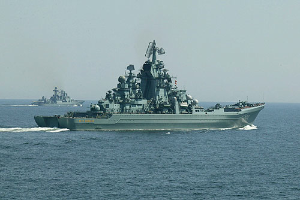Turkey's Missile Defense Challenges
By Richard Weitz (vol. 3, no. 5 of the Turkey Analyst)
By dint of geography and its strategic relations, Turkey has assumed a pivotal role in Europe’s future ballistic missile defense (BMD) architecture. The United States has been lobbying Ankara to participate in its program within a NATO framework, while Iran and Russia have encouraged Turkey to keep its distance from Washington’s BMD plans. Turkish officials have strived to balance these competing forces while leveraging them to advance Turkey’s own regional security interests.
Turkey and Russia Deepen Energy Partnership
By Richard Weitz (vol. 3, no. 1 of the Turkey Analyst)
After Putin Visit, Turkish-Russian Ties Set to Develop Further
By M. K. Kaya (vol. 2, no. 14 of the Turkey Analyst)
As Turkey has become estranged from its Western allies, especially as a result of having being cold-shouldered by the European Union, the country has come to develop closer relations with Russia, a historical rival. During the recent the visit of Russian prime minister Vladimir Putin to Turkey, the two countries signed cooperation protocols in several fields, mostly regarding energy issues. The visit saw progress in advancing regional energy projects that benefit both countries, Turkey obtaining Russian support for its Samsun-Ceyhan oil project and Russia obtaining Turkish agreement for its South Stream gas project. The burgeoning relationship should nevertheless not be seen as an attempt by Ankara to distance itself from the West, but as a Russian move to fill the vacuum left by American and European neglect of Turkey.
Between Political Crises: Turkish Energy Policy
By the Editors (vol. 1, no. 5 of the Turkey Analyst)
Realizing the rising need for the transportation of the Caspian Basin’s energy resources to world markets in the 1990s, Turkish decision-makers claimed that “Turkey should become an energy corridor and an energy hub for producer and consumer countries”. All recent governments have to different degrees supported this vision. Turkey’s energy hub prospects were boosted by the rapid developments in the Turkish economy, which created an increasing demand for energy resources, and forced the “Energy Strategy” to the focal point of political and bureaucratic circles.
Turkey Vulnerable to Rising Russian Power in the Black Sea
By Micha’el Tanchum (vol. 7, no. 7 of the Turkey Analyst)
With the annexation of Crimea, Turkey faces a stronger and more emboldened Russian naval power in the Black Sea. A resurgent Russia may be tempted to exploit its temporary naval dominance to alter current Black Sea energy exploitation and transportation arrangements more in its favor and to the detriment of Turkey and its partners in the Caucasus. The politically motivated stoppage of Turkey’s National Warship Project’s production schedule has created a window of vulnerability in Turkey’s Black Sea naval defenses in the face of rapidly rising Russian naval power.




